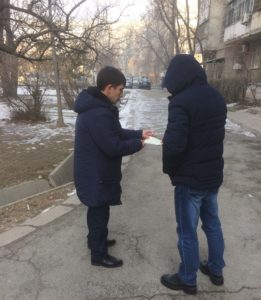
Author: Olga Ochneva, Kyrgyzstan
Kyrgyzstan has adopted new legislation on drug-related crimes. Amendments have been introduced into a number of national legal codes within the broad judiciary reform in the country. The amendments will come into force starting from 2019. Initiators of the reform declare the ideas of humanisation and decriminalisation, but the practitioners and the community expect an opposite outcome.
Unaffordable fines or imprisonment
Aybek (the name is changed) has recently been released from jail. He spent three years behind the bars for 3.5 grams of hashish, which he bought for his own use.
“In 2014, Aybek was caught with drugs and was told to pay a fine of 30,000 Kyrgyz Soms (375 euros) and was let go. Soon, he was seized again for a similar offence. The fine was left in force and in addition, Aybek was sentenced to three years of imprisonment,” the street lawyer of the Ranar Foundation Denis Kucheryaviyis telling. “Now Aybek lives in our social dormitory. He has no passport and he has no job. During his years in prison, he was able to pay only 30% of the fine. He has been told he cannot get his passport unless he pays the whole sum. How can he find a job with no documents? Recently, we learned that he was put on a wanted list due to his failure to pay the fine, so now he faces the threat of imprisonment again.”
According to the Criminal Code currently in force, possession of drugs with no intent to sell in big amounts exceeding one gram for heroin and three grams for hashish is now punished with a fine of 250 to 650 euros or with imprisonment for a term of up to five years. In the new Criminal Code, the fines will be increased up to 3,250-3,750 euros.
“There will be a huge increase in fines. The minimum fine will be 3,250 euros. Will a person injecting drugs be able to pay such a sum at least once in his life?” asks Sergey Bessonov, Executive Director of the Harm Reduction Network Association. “An alternative to paying the fine is deprivation of liberty for up to five years, though the fine will not “disappear” completely and will only move to another category of 1,250-1,750 euros. Now Aybek does not know how to pay 375 euros, and starting from 2019 people will be released after years in prison with fines, which will be 3-5 times higher.”
Humanisation or criminalisation
Fines for the small amounts of drugs (up to 1 gram of heroin and up to 3 grams of hashish) will also be increased. The administrative fine will grow 30-fold: from 12-25 euros to 370-750 euros.

“The punishment for the small amounts of drugs will be toughened in the Code of Administrative Offences depending on the number of similar offences during a year. For the first offence, the fine will amount to 2,000 Kyrgyz Soms (23 euros); for the second offence, an administrative arrest for five days will be applied; for the third offence, the fine will amount to 650 euros. In the new Code of Offences, the punishment will not be toughened and there will be no criminal record. Probably this is what the humanisation is about,” assumes Sergey Bessonov. “However, if we look at the practice, most people are seized with the amount of heroin 1.2 -1.5 g which is considered to be a big amount and falls under provisions of the Criminal Code. After the fines are increased, there is a probability that the number of people seized with small amounts of drugs will be growing. The worst thing is that violation of the Code of Offences may also lead to the imprisonment in case if the fine is not paid on time. A person will have two months to pay 370 euros. After this term, the fine will be doubled and the payment period will be extended by one more month. After this month is over, if the fine is still not paid, article 351 of the Criminal Code will come into force meaning from 2.5 to 5 years of imprisonment.”
Currently, Sergey Bessonov and the lawyers of his organisation desperately fight not only for Aybek to stay free, but also to change the legislative amendments proposed. They are due to come into force in one year so there is still a chance to collect evidence that such amendments will lead to the criminalisation of people who use drugs.
“Introducing heavy fines may lead to the growth of corruption practices and increase in the number of prison population, which will have a negative impact on the national budget. Now we are making attempts to show the evidence of all the risks to people developing the new codes,” says Sergey Bessonov. “We need alternative punitive measures and effective treatment programmes. Members of the community were not able to take part in the development of the new codes, but we hope that our voices will be heard. We are doing our best at the national level and we also plan to tell about the recent developments in the drug policy to the international community at AIDS 2018 Conference.”



